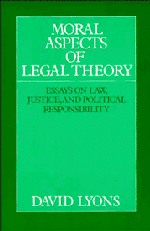Book contents
- Frontmatter
- Contents
- Preface
- Acknowledgments
- 1 The internal morality of law
- 2 On formal justice
- 3 Legal formalism and instrumentalism - a pathological study
- 4 Moral aspects of legal theory
- 5 Formal justice and judicial precedent
- 6 Derivability, defensibility, and the justification of judicial decisions
- 7 Constitutional interpretation and original meaning
- 8 A preface to constitutional theory
- 9 Basic rights and constitutional interpretation
- 10 Critical analysis and constructive interpretation
4 - Moral aspects of legal theory
Published online by Cambridge University Press: 10 December 2009
- Frontmatter
- Contents
- Preface
- Acknowledgments
- 1 The internal morality of law
- 2 On formal justice
- 3 Legal formalism and instrumentalism - a pathological study
- 4 Moral aspects of legal theory
- 5 Formal justice and judicial precedent
- 6 Derivability, defensibility, and the justification of judicial decisions
- 7 Constitutional interpretation and original meaning
- 8 A preface to constitutional theory
- 9 Basic rights and constitutional interpretation
- 10 Critical analysis and constructive interpretation
Summary
This paper concerns the so-called separation of law and morals, and its place in legal theory. The subject is suggested by John Austin's famous remark, “The existence of law is one thing; its merit or demerit is another.” I shall refer to such a doctrine as the separation thesis, though one of the aims of this paper is to distinguish different ways in which the separation of law and morals can be conceived.
The separation thesis is regarded as a dividing line in legal theory: legal positivists are supposed to accept it and natural lawyers to reject it. Those who accept it seem to regard it as an important truism, neglect of which invites both moral and theoretical confusion.
The meaning of the separation thesis, as suggested by Austin's remark, may seem perfectly clear, and this may explain why the doctrine has received little systematic attention. The most extensive discussion is provided by H. L. A. Hart in his valuable Holmes lecture, which defends the doctrine along with legal positivism. Hart's approach has been widely adopted. However, his formulation of the thesis appears to be falsified by his own arguments, and his discussion suggests other versions of the doctrine, with widely divergent implications.
Critics of positivism have not helped much to clarify the issues. Lon Fuller's reply to Hart, for example, suggests considerable confusion, and Ronald Dworkin's critical discussions of positivism, which seem to have some bearing on the matter, fail to address it clearly.
- Type
- Chapter
- Information
- Moral Aspects of Legal TheoryEssays on Law, Justice, and Political Responsibility, pp. 64 - 101Publisher: Cambridge University PressPrint publication year: 1993
- 5
- Cited by



